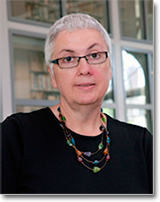Behind the Scenes – What Elizabeth E. Kirk said to Publishers Weekly
Publishers Weekly, international trade magazine of book publishing and book selling, recently published an article about Knowledge Unlatched: “Can Open Access Save the Scholarly Monograph? ALA Midwinter Spotlight.”
The article examines whether KU can offer hope for a turnaround to the downward spiral in which the scholarly monograph finds itself. Along with an interview with Executive Director Frances Pinter, Elizabeth E. Kirk, associate librarian for Information resources at Dartmouth College, Charles Watkinson, director of the University of Michigan Press and James L. Mullins, the dean of libraries at Purdue University were asked their thoughts on KU.
Eliz Kirk, who is also a member of the KU Library Steering Committee, was kind enough to grant us permission to publish her full responses to Publishers Weekly about her attraction to KU, conclusions from the KU Pilot project, and the future for KU as well as OA in general, which you can read below.
1. Why did you get involved in this project? What attracted you?
I have the privilege to work in an institution that has a strong sense of responsibility for solving global problems. As a research university, Dartmouth’s main contributions toward finding those solutions are through education, engagement, research, and scholarship. Our authors produce ground-breaking work in both short and long forms. To give that work its broadest possible impact—to enable it to be useful wherever it can meet needs—it needs to be accessible to readers globally. Open Access is a necessary condition for making that happen.
Dartmouth and the Dartmouth Library have promoted Open Access for a long time and have put our money where our mouth is on this. We’re founding members of the Coalition for Open Access Publishing Equity and pay author publication fees in support of Open Access journal publishing; we participate in SCOAP3 to open high energy physics journals to the world; we work closely with our press, the University Press of New England, to Open Access to monographs published under the Dartmouth imprint; we work with BioOne to produce its Open Access journal Elementa: Science of the Anthropocene; and we produce our own faculty-edited Open Access publications. When Knowledge Unlatched approached libraries with a model for supporting Open Access to long form scholarship, we were very interested. A structure to support Open Access monographic publishing that works with multiple presses and can grow sustainably is a critical need. Frances Pinter and the wonderful professionals she works with have the credentials and the credibility with the publishing community to achieve success.
2. What are the most significant takeaways for you from the results of the Pilot?
First of all, that there are publishers in both the university press and commercial sectors who are interested in trying new business models. The idea that the publishing community as a whole is resistant to change has been demonstrated to be a fallacy. That’s very exciting.
Second, that support of Open Access models can be a smart business decision. The per-title cost of the Pilot Collection came in at under $43 due to the number of participating libraries. That’s less than our average annual cost per title for conventional purchases. Libraries can demonstrate to their parent institutions that participating in Knowledge Unlatched actually saves institutional dollars. This will have a pronounced impact on American libraries if more European publishers participate in future cycles as discounts on foreign purchases are more difficult for us to attain—I’d assume that for non-U.S. libraries, strong participation from our publishers will have a parallel effect.
Libraries buy globally and publishers sell globally, so shouldn’t we be able to make this work? Knowledge Unlatched has proven that it can.
Third, that multinational Open Access publishing is possible. This is immense. The national differences in copyright law and intellectual property protection, nationalized versus institutionally-based licensing and funding models, and cultural sensitivities have been very difficult to surmount. Libraries buy globally and publishers sell globally, so shouldn’t we be able to make this work? Knowledge Unlatched has proven that it can.
Fourth, that honest and respectful communication between libraries and publishers can build trust. Getting Knowledge Unlatched off the ground required trust between the players, and the conversations that moved the Pilot forward enabled that by offering publishers and librarians opportunities to explain their business needs to each other and to have those understood and respected. That should be very helpful for a wide range of future projects. Adversarial relationships won’t move anyone’s interests forward.
Last, and not at all least, is that trying out new models takes a great deal of time and effort. There is no way around that investment in getting work redirected for proof of concept projects. Socializing and routinizing the model can only come after all that work is done.
3. Looking forward as the project attempts to scale up, what are the most significant challenges (e.g., metadata, change in working practices)? Or, in other words, what do you see as the library board's greatest responsibilities?
I think that we have some exciting challenges to look forward to.
We need to inspire broader participation among libraries. The Pilot shows that the financial investment is advantageous in comparison to conventional purchasing. Simple arithmetic argues that more libraries investing can support a larger number of unlatched titles.
Growing library participation means articulating a clear and compelling argument for supporting open access financially that libraries can make to their parent institutions. Higher education institutions everywhere are working to control costs. Libraries need to be able to show that supporting Knowledge Unlatched and other initiatives like it can help achieve that goal.
For libraries, supporting publishers through Knowledge Unlatched has been more cost-effective than purchasing monographs conventionally. Everyone wins.
Institutional buy-in is actually part of a much broader and more complex set of issues around how universities depend on external publication to credential their faculty scholarship and validate that work for promotion, a system that now exists with far too many free riders, when one considers the number of university-supported presses in comparison to the virtually universal dependence on the system. The Mellon Foundation, ARL, and AAU are looking for sustainable solutions to these issues. It will be interesting to see how Knowledge Unlatched may offer its services to promote these programs.
The library board also needs to demonstrate to publishers that libraries are going to participate for the long term. Participation requires effort on the publishing side as well as the library side and it’s appropriate that publishers ask what the return on that investment will be. There needs to be a convincing value proposition to give publishers, just as there has to be one for libraries and universities.
The board needs to support a variety of technical issues, including changes to workflows and budget allocations in libraries and metadata creation to enable discovery of Knowledge Unlatched and other open content. There are practical considerations as well as philosophical shifts and addressing both fronts is necessary.
Most challenging will be understanding the practical impact of a variety of pending national mandates on Open Access to research outputs, both in the U.S. and in Europe. What will this mean for monographs? What will the final requirements look like, country by country? All that we can say at this point is that libraries, their universities, and publishers will all need to adjust how they work. Knowledge Unlatched will need to make adjustments as well, and we don’t yet know what those will be. This may pause a scale-up, as it will be critical for us to understand how Knowledge Unlatched may most effectively fit into an evolving landscape. So we will need to think carefully about next steps and to be ready to move forward quickly when the fog clears.
4. Is this the OA model you find most promising for long-form publications? What compares to it?
All OA models are in evolution and need to have space to be so. Having said that, I believe that Knowledge Unlatched is an excellent example of a model that works and that can show a way forward. Knowledge Unlatched understands the investment that publishers make and the value that they add to research and scholarship. The Pilot has demonstrated that those costs can be recouped in an Open Access context. For libraries, supporting publishers through Knowledge Unlatched has been more cost-effective than purchasing monographs conventionally. Everyone wins—and that is critical for ongoing success. Derk Haank of Springer famously said that Open Access is a business model and not an orthodoxy. There can be no winners versus losers. Knowledge Unlatched works because it meets needs across the spectrum, including and especially the needs of readers globally who now have access to excellent scholarship.
Comparative models are the mixed model approaches that presses like MIT and UPNE (among others) are exploring that include print-for-purchase and e-for-free. There hasn’t been sufficient time to collect the necessary amount of data to understand how that model works for presses on an individual basis, just as we don’t yet know the long-term impact of Knowledge Unlatched. On the journal side, SCOAP3 is a comparable model. It will be interesting to see if other scholarly interests step forward the way that the physicists have. I believe that working with libraries will help those that do.
Knowledge Unlatched works because it meets needs across the spectrum, including and especially the needs of readers globally who now have access to excellent scholarship.
To echo Derk Haank, the traditional reader pays/subscription model is just a business model and not an orthodoxy, and one that effectively met the requirements of a print-based world. In the networked world, that model is proving to be more of an impediment to finding readers than a roadmap to them. At the same time, paying legitimate costs is still necessary to make scholarly publishing sustainable and to enable that production to accomplish the missions of research universities for the betterment of a global society. It will take time for new business models to develop. The changing landscape of national OA mandates and how they may be made financially feasible is very much in flux and there can be no settled models on these shifting sands. Open Access publishing programs will need to adapt quickly to these changes and keep baseline values at the forefront, such as flexibility, affordability, sustainability, and access. These are fundamental to Knowledge Unlatched, so I expect that we will continue to be relevant and to be part of the conversation in the future.
This is an exciting time to be part of Knowledge Unlatched.





